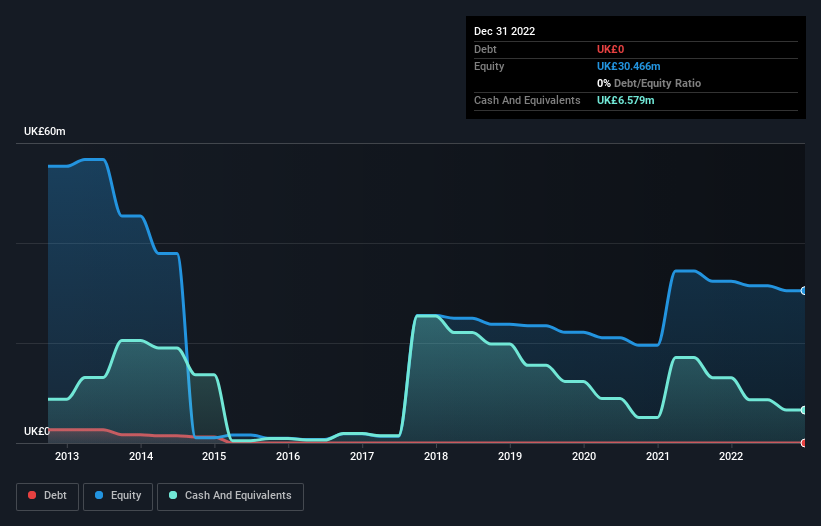Here's Why We're Watching Jersey Oil and Gas' (LON:JOG) Cash Burn Situation
Just because a business does not make any money, does not mean that the stock will go down. For example, although software-as-a-service business Salesforce.com lost money for years while it grew recurring revenue, if you held shares since 2005, you'd have done very well indeed. But while the successes are well known, investors should not ignore the very many unprofitable companies that simply burn through all their cash and collapse.
So, the natural question for Jersey Oil and Gas (LON:JOG) shareholders is whether they should be concerned by its rate of cash burn. In this article, we define cash burn as its annual (negative) free cash flow, which is the amount of money a company spends each year to fund its growth. Let's start with an examination of the business' cash, relative to its cash burn.
See our latest analysis for Jersey Oil and Gas
How Long Is Jersey Oil and Gas' Cash Runway?
A cash runway is defined as the length of time it would take a company to run out of money if it kept spending at its current rate of cash burn. As at December 2022, Jersey Oil and Gas had cash of UK£6.6m and no debt. Importantly, its cash burn was UK£6.3m over the trailing twelve months. Therefore, from December 2022 it had roughly 12 months of cash runway. Importantly, analysts think that Jersey Oil and Gas will reach cashflow breakeven in 4 years. Essentially, that means the company will either reduce its cash burn, or else require more cash. Depicted below, you can see how its cash holdings have changed over time.
How Is Jersey Oil and Gas' Cash Burn Changing Over Time?
Jersey Oil and Gas didn't record any revenue over the last year, indicating that it's an early stage company still developing its business. So while we can't look to sales to understand growth, we can look at how the cash burn is changing to understand how expenditure is trending over time. While it hardly paints a picture of imminent growth, the fact that it has reduced its cash burn by 25% over the last year suggests some degree of prudence. While the past is always worth studying, it is the future that matters most of all. For that reason, it makes a lot of sense to take a look at our analyst forecasts for the company.
Can Jersey Oil and Gas Raise More Cash Easily?
Even though it has reduced its cash burn recently, shareholders should still consider how easy it would be for Jersey Oil and Gas to raise more cash in the future. Companies can raise capital through either debt or equity. One of the main advantages held by publicly listed companies is that they can sell shares to investors to raise cash and fund growth. By comparing a company's annual cash burn to its total market capitalisation, we can estimate roughly how many shares it would have to issue in order to run the company for another year (at the same burn rate).
Jersey Oil and Gas' cash burn of UK£6.3m is about 9.6% of its UK£66m market capitalisation. Given that is a rather small percentage, it would probably be really easy for the company to fund another year's growth by issuing some new shares to investors, or even by taking out a loan.
So, Should We Worry About Jersey Oil and Gas' Cash Burn?
Jersey Oil and Gas appears to be in pretty good health when it comes to its cash burn situation. Not only was its cash burn reduction quite good, but its cash burn relative to its market cap was a real positive. One real positive is that analysts are forecasting that the company will reach breakeven. While we're the kind of investors who are always a bit concerned about the risks involved with cash burning companies, the metrics we have discussed in this article leave us relatively comfortable about Jersey Oil and Gas' situation. On another note, we conducted an in-depth investigation of the company, and identified 6 warning signs for Jersey Oil and Gas (3 are significant!) that you should be aware of before investing here.
Of course Jersey Oil and Gas may not be the best stock to buy. So you may wish to see this free collection of companies boasting high return on equity, or this list of stocks that insiders are buying.
Have feedback on this article? Concerned about the content? Get in touch with us directly. Alternatively, email editorial-team (at) simplywallst.com.
This article by Simply Wall St is general in nature. We provide commentary based on historical data and analyst forecasts only using an unbiased methodology and our articles are not intended to be financial advice. It does not constitute a recommendation to buy or sell any stock, and does not take account of your objectives, or your financial situation. We aim to bring you long-term focused analysis driven by fundamental data. Note that our analysis may not factor in the latest price-sensitive company announcements or qualitative material. Simply Wall St has no position in any stocks mentioned.

 Yahoo Finance
Yahoo Finance 
